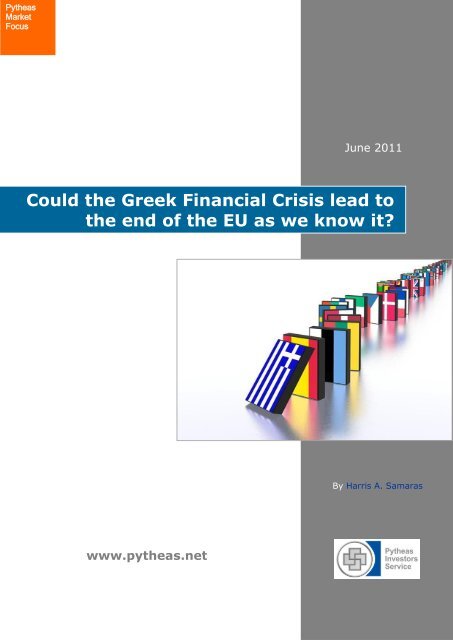Could the Greek Financial Crisis lead to the end of the EU as we know it?
But is the Greek financial crisis only Greek? Is it only a financial crisis? Is it only a social crisis? Or is it rather primarily a political crisis of the whole of Europe? Only a mindfully blind, naive or uninformed person cannot realize that this is no longer a matter just for Athens, but for Brussels. Indeed, it is now mostly a Franco-German problem above all since their banks are most exposed. If Greece is let to go bankrupt, the Euro will disappear. The very principle of the EU will be challenged. Unemployment will rise again, Germany including (which has up to now only benefited from an undervalued Euro). If we let Greece go bankrupt, what lies ahead is an economic and political crisis worse than that of 2008. It is therefore necessary to change our perspective. We must stop thinking of the Greek problem, and start thinking of the problem of the European Union.
But is the Greek financial crisis only Greek? Is it only a financial crisis? Is it only a social crisis? Or is it rather primarily a political crisis of the whole of Europe?
Only a mindfully blind, naive or uninformed person cannot realize that this is no longer a matter just for Athens, but for Brussels. Indeed, it is now mostly a Franco-German problem above all since their banks are most exposed.
If Greece is let to go bankrupt, the Euro will disappear. The very principle of the EU will be challenged. Unemployment will rise again, Germany including (which has up to now only benefited from an undervalued Euro). If we let Greece go bankrupt, what lies ahead is an economic and political crisis worse than that of 2008. It is therefore necessary to change our perspective. We must stop thinking of the Greek problem, and start thinking of the problem of the European Union.
Create successful ePaper yourself
Turn your PDF publications into a flip-book with our unique Google optimized e-Paper software.
Py<strong>the</strong><strong>as</strong><br />
Market<br />
Focus<br />
June 2011<br />
<strong>Could</strong> <strong>the</strong> <strong>Greek</strong> <strong>Financial</strong> <strong>Crisis</strong> <strong>lead</strong> <strong>to</strong><br />
<strong>the</strong> <strong>end</strong> <strong>of</strong> <strong>the</strong> <strong>EU</strong> <strong>as</strong> <strong>we</strong> <strong>know</strong> <strong>it</strong>?<br />
By Harris A. Samar<strong>as</strong><br />
www.py<strong>the</strong><strong>as</strong>.net
Py<strong>the</strong><strong>as</strong><br />
Market<br />
Focus<br />
Years <strong>of</strong> unrestrained sp<strong>end</strong>ing, cheap l<strong>end</strong>ing and failure <strong>to</strong> implement financial reforms left<br />
Greece badly exposed when <strong>the</strong> global economic downturn struck. This whisked away a<br />
curtain <strong>of</strong> partly fiddled statistics <strong>to</strong> reveal debt levels and defic<strong>it</strong>s that exceeded lim<strong>it</strong>s set by<br />
<strong>the</strong> Eurozone. Greece's cred<strong>it</strong> rating h<strong>as</strong> been downgraded <strong>to</strong> <strong>the</strong> lo<strong>we</strong>st in <strong>the</strong> Eurozone,<br />
meaning <strong>it</strong> will more than likely vie<strong>we</strong>d <strong>as</strong> a financial black hole by foreign inves<strong>to</strong>rs. <strong>Greek</strong><br />
national debt, put at more than €300 billion, is bigger than <strong>the</strong> country's economy, w<strong>it</strong>h valid<br />
estimates predicting <strong>it</strong> will reach 125% <strong>of</strong> gross domestic product in 2011. This leaves <strong>the</strong><br />
country struggling <strong>to</strong> pay <strong>it</strong>s bills <strong>as</strong> interest rates on existing debts rise. The <strong>Greek</strong><br />
government <strong>of</strong> Prime Minister George Papandreou, which inher<strong>it</strong>ed much <strong>of</strong> <strong>the</strong> financial<br />
burden when <strong>it</strong> <strong>to</strong>ok <strong>of</strong>fice about a year ago, h<strong>as</strong> already scrapped most <strong>of</strong> <strong>it</strong>s pre-election<br />
promises and is unsuccessfully in <strong>the</strong> process <strong>of</strong> implementing harsh and unpopular sp<strong>end</strong>ing<br />
cuts…<br />
But is <strong>the</strong> <strong>Greek</strong> financial crisis only <strong>Greek</strong>? Is <strong>it</strong> only a financial crisis? Is <strong>it</strong> only a<br />
social crisis? Or is <strong>it</strong> ra<strong>the</strong>r primarily a pol<strong>it</strong>ical crisis <strong>of</strong> <strong>the</strong> whole <strong>of</strong> Europe?<br />
Only a mindfully blind, naive or uninformed person cannot realize that this is no<br />
longer a matter just for A<strong>the</strong>ns, but for Brussels. Indeed, <strong>it</strong> is now mostly a Franco-<br />
German problem above all since <strong>the</strong>ir banks are most exposed.<br />
Greece will never be able <strong>to</strong> repay <strong>it</strong>s debts at <strong>the</strong> announced short period. The <strong>EU</strong> cannot<br />
expect a miracle from Greece, <strong>as</strong> if <strong>it</strong> could undo <strong>the</strong> results <strong>of</strong> 30 years <strong>of</strong> lax policies in a<br />
few months. It is impossible! The numerous aid plans, even if <strong>the</strong>y have so far succeeded in<br />
avoiding default, failed <strong>to</strong> clear <strong>the</strong> long-term liabil<strong>it</strong>ies (See also by Py<strong>the</strong><strong>as</strong> “The long<br />
overdue loan for Greece is announced. Is <strong>it</strong> enough?”).<br />
Yes, (a) <strong>the</strong> <strong>Greek</strong> economy must be reformed; (b) <strong>the</strong> unimaginable w<strong>as</strong>te <strong>of</strong> tax payers<br />
money, through gross fund allocation inefficiencies, pol<strong>it</strong>ical favor<strong>it</strong>ism, vote mongering,<br />
cronyism and corruption must <strong>end</strong>; (c) a much smaller and reformed public sec<strong>to</strong>r, that<br />
serves <strong>the</strong> taxpayers best interests and needs and not those <strong>of</strong> pol<strong>it</strong>ical patrons must be<br />
established; (d) a pursu<strong>it</strong> and prosecution <strong>of</strong> presently wide spread tax ev<strong>as</strong>ion practices must<br />
take place. All <strong>of</strong> <strong>the</strong> above would immediately provide Greece w<strong>it</strong>h a considerable primary<br />
surplus, enabling <strong>the</strong> Country <strong>to</strong> keep repaying <strong>it</strong>s debt; and <strong>it</strong> would also immediately enable<br />
<strong>the</strong> Country’s credi<strong>to</strong>rs <strong>to</strong> grant Greece w<strong>it</strong>h debt schedule extensions and/or o<strong>the</strong>r term<br />
revisions that would make repayment less onerous.<br />
But what about <strong>the</strong> average <strong>Greek</strong>? Does <strong>the</strong> average <strong>Greek</strong> view things <strong>the</strong> same way<br />
and is he/she willing <strong>to</strong> undertake any sacrifices? The clear ans<strong>we</strong>r is NO! Desp<strong>it</strong>e<br />
<strong>the</strong> fact that <strong>to</strong> a large degree <strong>the</strong> average <strong>Greek</strong> is equally responsible through<br />
his/her direct involvement in corruption and tax ev<strong>as</strong>ion… is now in <strong>the</strong> streets<br />
demonstrating against <strong>the</strong> government, not willing <strong>to</strong> produce, not willing <strong>to</strong> work…<br />
<strong>the</strong> <strong>Greek</strong> demonstrating in <strong>the</strong> streets day after day, is by v<strong>as</strong>t major<strong>it</strong>y <strong>the</strong> same<br />
<strong>Greek</strong> that through favor<strong>it</strong>ism also abused <strong>the</strong> system, for decades… characterized<br />
by some kind <strong>of</strong> a “spoiled child syndrome”, by excessive self-centered and immature<br />
behavior… that wants chocolate no matter what… expecting in this c<strong>as</strong>e for his fellow<br />
European c<strong>it</strong>izen <strong>to</strong> pay for this chocolate…<br />
Ano<strong>the</strong>r dimension... One must remember that <strong>the</strong> European monetary union h<strong>as</strong> pol<strong>it</strong>ical<br />
opponents that are now playing <strong>the</strong>ir hand and <strong>as</strong>piring <strong>to</strong> <strong>it</strong>s collapse. No less importantly,<br />
one must remember that financial specula<strong>to</strong>rs are also players, among <strong>the</strong>m <strong>the</strong> big<br />
investment houses and hedge funds – who are doing what <strong>the</strong>y have been doing since <strong>the</strong>ir<br />
existence: make money – who gain from instabil<strong>it</strong>y, and if <strong>the</strong>y can manage <strong>to</strong> direct <strong>it</strong>, <strong>the</strong>y<br />
rake in huge pr<strong>of</strong><strong>it</strong>s… These antagonists <strong>of</strong> <strong>the</strong> Euro and <strong>the</strong> specula<strong>to</strong>rs found an ally<br />
w<strong>it</strong>hin <strong>the</strong> Eurozone: German populism. From <strong>the</strong> beginning <strong>of</strong> <strong>the</strong> European project,<br />
Germans accepted <strong>it</strong> w<strong>it</strong>h mixed feelings. W<strong>it</strong>hin a un<strong>it</strong>ed Europe, Germany loses <strong>it</strong>s<br />
uniqueness. But that w<strong>as</strong> precisely <strong>the</strong> declared aim <strong>of</strong> <strong>the</strong> union: when Germany is part <strong>of</strong> a<br />
un<strong>it</strong>ed Europe, <strong>the</strong>re are no European wars. Or are <strong>the</strong>re?<br />
Copyright © 2011 Py<strong>the</strong><strong>as</strong> Lim<strong>it</strong>ed 17 June 2011 2
Py<strong>the</strong><strong>as</strong><br />
Market<br />
Focus<br />
Although Germany is <strong>the</strong> greatest beneficiary <strong>of</strong> <strong>the</strong> European Union and <strong>the</strong><br />
Eurozone, <strong>the</strong> Germans feel that Europe lives at <strong>the</strong>ir expense. As <strong>the</strong> largest<br />
economy in <strong>the</strong> <strong>EU</strong>, Germany makes <strong>the</strong> largest contribution <strong>to</strong> <strong>it</strong>s budget, but <strong>the</strong><br />
<strong>EU</strong>'s budget is small, about 1% <strong>of</strong> <strong>the</strong> GDP <strong>of</strong> each member state. This expense<br />
pales in<strong>to</strong> insignificance in comparison w<strong>it</strong>h advantages from which Germany<br />
benef<strong>it</strong>s.<br />
To see how far Germany's populist narrative inverts real<strong>it</strong>y, you only have <strong>to</strong> remember that<br />
<strong>the</strong> fact that Greece h<strong>as</strong> a trade defic<strong>it</strong> (for which Greece is guilty) works <strong>to</strong> <strong>the</strong> benef<strong>it</strong> <strong>of</strong> <strong>the</strong><br />
o<strong>the</strong>r <strong>EU</strong> countries, and first <strong>of</strong> foremost <strong>to</strong> <strong>the</strong> benef<strong>it</strong> <strong>of</strong> Germany, which is <strong>the</strong> <strong>lead</strong>ing<br />
exporter <strong>to</strong> Greece. Salary costs in Greece (ano<strong>the</strong>r <strong>Greek</strong> fault) have financed private<br />
consumption in Greece, which h<strong>as</strong> financed German exports.<br />
The accession <strong>of</strong> Greece and <strong>the</strong> "<strong>we</strong>ak" countries <strong>to</strong> <strong>the</strong> Eurozone generated a spiral <strong>of</strong> rising<br />
prices, which brought in train wage rises. One <strong>of</strong> <strong>the</strong> re<strong>as</strong>ons is that exporters' prices, chiefly<br />
<strong>of</strong> German exporters, became uniform in <strong>the</strong> Euro block desp<strong>it</strong>e <strong>the</strong> gaps in purch<strong>as</strong>ing po<strong>we</strong>r<br />
bet<strong>we</strong>en <strong>the</strong> populations in <strong>the</strong> different countries. Again, Germany gains!<br />
The aid <strong>to</strong> Greece will not cost <strong>the</strong> German taxpayer anything. Germany will l<strong>end</strong> <strong>to</strong><br />
Greece at 5% while Germany <strong>it</strong>self raises money more cheaply. <strong>Greek</strong> recovery will<br />
serve <strong>the</strong> interests <strong>of</strong> <strong>the</strong> <strong>EU</strong> and <strong>it</strong>s member states beyond <strong>the</strong> common interest in<br />
preserving <strong>the</strong> stabil<strong>it</strong>y <strong>of</strong> <strong>the</strong> Euro. Desp<strong>it</strong>e this, German nationalistic populism h<strong>as</strong><br />
broken out again in an ugly way, and Chancellor Merkel did not have <strong>the</strong> courage <strong>to</strong><br />
tell <strong>the</strong> Germans <strong>the</strong> truth!<br />
And ano<strong>the</strong>r dimension… Media coverage <strong>of</strong> <strong>the</strong> debt crisis in Greece not only inflated and<br />
accelerated <strong>the</strong> process; <strong>it</strong> became a central part <strong>of</strong> <strong>it</strong>. The coverage swallo<strong>we</strong>d up <strong>the</strong> crisis,<br />
and <strong>the</strong> b<strong>as</strong>ic facts <strong>we</strong>re almost forgotten.<br />
The chief re<strong>as</strong>on is that <strong>the</strong> main providers <strong>of</strong> information, <strong>of</strong> which <strong>the</strong> most prominent are<br />
Bloomberg and Reuters, are called "news agencies", but in fact long ago <strong>the</strong>y have also<br />
become a platform for <strong>the</strong> <strong>lead</strong>ing players in <strong>the</strong> financial markets <strong>to</strong> promote <strong>the</strong>ir point <strong>of</strong><br />
view. The overwhelming major<strong>it</strong>y <strong>of</strong> <strong>the</strong> content provided by <strong>the</strong>se agencies originates w<strong>it</strong>h<br />
interested parties. It's interesting, newsy, but <strong>to</strong> a certain extent bi<strong>as</strong>ed. When hedge fund<br />
managers, big investment houses, and those who work for <strong>the</strong>m directly and indirectly,<br />
provide <strong>as</strong>sessments and forec<strong>as</strong>ts, <strong>the</strong>y have an ag<strong>end</strong>a <strong>to</strong> influence <strong>the</strong> direction <strong>of</strong> events.<br />
What makes <strong>the</strong> problem worse is <strong>the</strong> fact that <strong>the</strong> news agencies are almost <strong>the</strong><br />
only sources for investment advisers in all <strong>the</strong> world's financial systems. They are<br />
also <strong>the</strong> main providers <strong>of</strong> material for business internet s<strong>it</strong>es. Thus <strong>the</strong> stance <strong>of</strong> <strong>the</strong><br />
<strong>lead</strong>ing players is disseminated in <strong>the</strong> Anglo-Saxon communications media <strong>as</strong> <strong>the</strong> b<strong>as</strong>is for <strong>the</strong><br />
experts' opinions. The unanim<strong>it</strong>y that w<strong>as</strong> <strong>the</strong> outstanding feature <strong>of</strong> <strong>the</strong> coverage <strong>of</strong> <strong>the</strong> crisis<br />
in Greece w<strong>as</strong> an expression <strong>of</strong> that bi<strong>as</strong>.<br />
The current crisis cannot be resolved by Greece ex<strong>it</strong>ing <strong>the</strong> Eurozone, <strong>as</strong> some have<br />
suggested. This would undermine <strong>the</strong> European banking system w<strong>it</strong>hin days and<br />
incre<strong>as</strong>e <strong>the</strong> public debt <strong>of</strong> o<strong>the</strong>r European countries.<br />
Now that <strong>the</strong> consequences are manifest, <strong>it</strong> would be e<strong>as</strong>y <strong>to</strong> d<strong>we</strong>ll on <strong>the</strong> mistakes that got<br />
<strong>the</strong> <strong>EU</strong> <strong>to</strong> this point. The <strong>EU</strong> should not have let Greece enter <strong>the</strong> Economic and Monetary<br />
Union w<strong>it</strong>h falsified figures. The <strong>EU</strong> should not have let <strong>the</strong> debt grow so large given <strong>the</strong><br />
country’s <strong>we</strong>ak economic fundamentals. The <strong>EU</strong> should have forced <strong>the</strong> <strong>Greek</strong>s <strong>to</strong> establish<br />
effective fiscal and economic inst<strong>it</strong>utions long ago... This though is now his<strong>to</strong>ry!<br />
If Greece is let <strong>to</strong> go bankrupt, <strong>the</strong> Euro will disappear. The very principle <strong>of</strong> <strong>the</strong> <strong>EU</strong><br />
will be challenged. Unemployment will rise again, Germany including (which h<strong>as</strong> up<br />
<strong>to</strong> now only benef<strong>it</strong>ed from an undervalued Euro). If <strong>we</strong> let Greece go bankrupt,<br />
what lies ahead is an economic and pol<strong>it</strong>ical crisis worse than that <strong>of</strong> 2008. It is<br />
<strong>the</strong>refore necessary <strong>to</strong> change our perspective. We must s<strong>to</strong>p thinking <strong>of</strong> <strong>the</strong> <strong>Greek</strong><br />
problem, and start thinking <strong>of</strong> <strong>the</strong> problem <strong>of</strong> <strong>the</strong> European Union. Solutions exist. We<br />
are only in dire need <strong>of</strong> <strong>the</strong> pol<strong>it</strong>ical courage <strong>to</strong> implement structural reforms and an<br />
Copyright © 2011 Py<strong>the</strong><strong>as</strong> Lim<strong>it</strong>ed 17 June 2011 3
Py<strong>the</strong><strong>as</strong><br />
Market<br />
Focus<br />
appropriate mechanism w<strong>it</strong>hin <strong>the</strong> <strong>EU</strong> that could solve such problems at birth enabling swift<br />
response and action. Establishing a European Ministry <strong>of</strong> Finance should be amongst o<strong>the</strong>r a<br />
serious consideration.<br />
At <strong>the</strong> same time <strong>the</strong> <strong>Greek</strong> pol<strong>it</strong>ical parties should realize that a spir<strong>it</strong> <strong>of</strong> collectiveness, pride<br />
and transparency must compliment every effort undertaken, s<strong>to</strong>p being vague, put <strong>the</strong>ir<br />
personal interests <strong>as</strong>ide and work <strong>as</strong> one, <strong>to</strong> first, explain and convince <strong>the</strong>ir co-c<strong>it</strong>izens that<br />
constructive painful steps need <strong>to</strong> be undertaken, and second, convince <strong>the</strong> European public<br />
opinion that <strong>Greek</strong> people are not lazy, corrupt, devious, and indulged, incapable <strong>of</strong> coping!<br />
See also o<strong>the</strong>r publications by Py<strong>the</strong><strong>as</strong> on Greece:<br />
► The long overdue loan for Greece is announced. Is <strong>it</strong> enough? (April 2010)<br />
► Greece must change or sink! (December 2009)<br />
► Greece unlikely <strong>to</strong> escape <strong>it</strong>s worst financial crisis <strong>of</strong> modern times! (July 2009)<br />
Disclaimer<br />
The above notes have been compiled <strong>to</strong> <strong>as</strong>sist you; ho<strong>we</strong>ver, actions taken <strong>as</strong> a result <strong>of</strong> this document are at <strong>the</strong> discretion <strong>of</strong> <strong>the</strong> reader and not<br />
PYTHEAS or Harris A. Samar<strong>as</strong>.<br />
Copyright © 2011 Py<strong>the</strong><strong>as</strong> Lim<strong>it</strong>ed 17 June 2011 4












